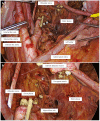Technical feasibility of laparoscopic extended surgery beyond total mesorectal excision for primary or recurrent rectal cancer
- PMID: 26811619
- PMCID: PMC4716071
- DOI: 10.3748/wjg.v22.i2.718
Technical feasibility of laparoscopic extended surgery beyond total mesorectal excision for primary or recurrent rectal cancer
Abstract
Relatively little is known about the oncologic safety of laparoscopic surgery for advanced rectal cancer. Recently, large randomized clinical trials showed that laparoscopic surgery was not inferior to open surgery, as evidenced by survival and local control rates. However, patients with T4 tumors were excluded from these trials. Technological advances in the instrumentation and techniques used by laparoscopic surgery have increased the use of laparoscopic surgery for advanced rectal cancer. High-definition, illuminated, and magnified images obtained by laparoscopy may enable more precise laparoscopic surgery than open techniques, even during extended surgery for T4 or locally recurrent rectal cancer. To date, the quality of evidence regarding the usefulness of laparoscopy for extended surgery beyond total mesorectal excision has been low because most studies have been uncontrolled series, with small sample sizes, and long-term data are lacking. Nevertheless, laparoscopic extended surgery for rectal cancer, when performed by specialized laparoscopic colorectal surgeons, has been reported safe in selected patients, with significant advantages, including a clear visual field and less blood loss. This review summarizes current knowledge on laparoscopic extended surgery beyond total mesorectal excision for primary or locally recurrent rectal cancer.
Keywords: Extended surgery; Laparoscopic surgery; Lateral pelvic lymph node dissection; Pelvic exenteration; Rectal cancer; Total mesorectal excision.
Figures




Similar articles
-
Laparoscopic Versus Open Lateral Lymph Node Dissection for Locally Advanced Low Rectal Cancer: A Subgroup Analysis of a Large Multicenter Cohort Study in Japan.Dis Colon Rectum. 2017 Sep;60(9):954-964. doi: 10.1097/DCR.0000000000000843. Dis Colon Rectum. 2017. PMID: 28796734
-
Laparoscopic mesorectal excision with preservation of the pelvic autonomic nerves for rectal cancer.Hepatogastroenterology. 2007 Jan-Feb;54(73):85-90. Hepatogastroenterology. 2007. PMID: 17419237
-
Laparoscopic total mesorectal excision: early and late results.Asian J Endosc Surg. 2011 Aug;4(3):99-106. doi: 10.1111/j.1758-5910.2011.00090.x. Epub 2011 Jun 20. Asian J Endosc Surg. 2011. PMID: 22776271 Review.
-
Total mesorectal excision for mid and low rectal cancer: Laparoscopic vs robotic surgery.World J Gastroenterol. 2016 Apr 7;22(13):3602-10. doi: 10.3748/wjg.v22.i13.3602. World J Gastroenterol. 2016. PMID: 27053852 Free PMC article.
-
Laparoscopic total mesorectal excision for rectal cancer surgery.Dig Dis. 2005;23(2):135-41. doi: 10.1159/000088595. Dig Dis. 2005. PMID: 16352893 Review.
Cited by
-
Laparoscopic total pelvic exenteration using transanal minimal invasive surgery technique with en bloc bilateral lymph node dissection for advanced rectal cancer.Surg Case Rep. 2016 Dec;2(1):74. doi: 10.1186/s40792-016-0198-6. Epub 2016 Jul 26. Surg Case Rep. 2016. PMID: 27460130 Free PMC article.
-
Wound infection in colorectal cancer resections through a laparoscopic approach: a single-center prospective observational study of over 3000 cases.Discov Oncol. 2021;12(1):2. doi: 10.1007/s12672-021-00396-8. Epub 2021 Feb 11. Discov Oncol. 2021. PMID: 33844707 Free PMC article.
-
The Short- and Long-Term Feasibility of Laparoscopic Surgery in Colon Cancer Patients with Bulky Tumors.J Gastrointest Surg. 2019 Sep;23(9):1893-1899. doi: 10.1007/s11605-019-04114-2. Epub 2019 Jan 31. J Gastrointest Surg. 2019. PMID: 30706379
-
Effect of 3D Animation Combined with Teach-Back Health Education on Pelvic Floor Muscle Training in LARS Patients: A Randomized Controlled Trial.J Nurs Manag. 2023 Feb 24;2023:6847933. doi: 10.1155/2023/6847933. eCollection 2023. J Nurs Manag. 2023. PMID: 40225656 Free PMC article. Clinical Trial.
-
Minimally Invasive Surgery for Pelvic Exenteration in Primary Colorectal Cancer.JSLS. 2020 Jul-Sep;24(3):e2020.00026. doi: 10.4293/JSLS.2020.00026. JSLS. 2020. PMID: 32714002 Free PMC article.
References
-
- Jacobs M, Verdeja JC, Goldstein HS. Minimally invasive colon resection (laparoscopic colectomy) Surg Laparosc Endosc. 1991;1:144–150. - PubMed
-
- Clinical Outcomes of Surgical Therapy Study Group. A comparison of laparoscopically assisted and open colectomy for colon cancer. N Engl J Med. 2004;350:2050–2059. - PubMed
-
- Buunen M, Veldkamp R, Hop WC, Kuhry E, Jeekel J, Haglind E, Påhlman L, Cuesta MA, Msika S, Morino M, et al. Survival after laparoscopic surgery versus open surgery for colon cancer: long-term outcome of a randomised clinical trial. Lancet Oncol. 2009;10:44–52. - PubMed
-
- Guillou PJ, Quirke P, Thorpe H, Walker J, Jayne DG, Smith AM, Heath RM, Brown JM. Short-term endpoints of conventional versus laparoscopic-assisted surgery in patients with colorectal cancer (MRC CLASICC trial): multicentre, randomised controlled trial. Lancet. 2005;365:1718–1726. - PubMed
-
- Jayne DG, Guillou PJ, Thorpe H, Quirke P, Copeland J, Smith AM, Heath RM, Brown JM. Randomized trial of laparoscopic-assisted resection of colorectal carcinoma: 3-year results of the UK MRC CLASICC Trial Group. J Clin Oncol. 2007;25:3061–3068. - PubMed
Publication types
MeSH terms
LinkOut - more resources
Full Text Sources
Other Literature Sources

